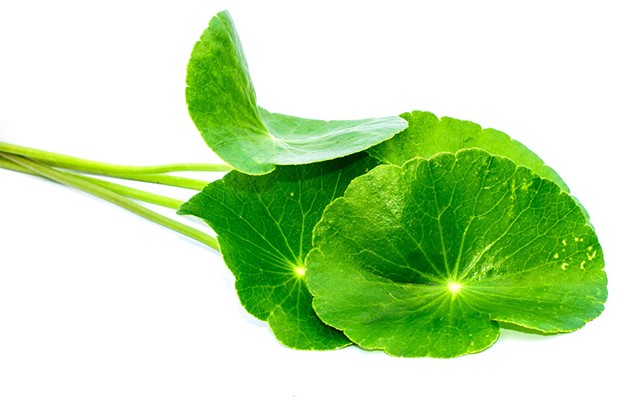
Tonic, anti-rheumatic, mild diuretic, sedative, peripheral vasodilator. Traditionally used to improve fertility, but research shows that its constituents may reduce fertility. Thins the blood and in large doses, helps to lower blood sugar levels. Used in Ayurvedic medicine to treat leprosy, skin ulcers, and other skin problems. Has a long-standing reputation as a rejuvenator, helping concentration and memory. Tonic for poor digestion. Fresh leaves are given to children with dysentary. It is also thought to be helpful for fevers, abdominal disorders, athsma, and bronchitis. The oil is used to promote hair growth. Used mainly in Western medicine for skin problems and wounds. Also has anti-inflammatory properties which make it effective for rheumatism, rheumatoid arthritis, and poor venous circulation.
Gotu kola has been important in the medicinal systems of central Asia for centuries. In Sri Lanka, it was purported to prolong life, as the leaves are commonly eaten by elephants. Numerous skin diseases, ranging from poorly healing wounds to leprosy, have been treated with gotu kola. Gotu kola also has a historical reputation for boosting mental activity and for helping a variety of illnesses, such as high blood pressure, rheumatism, fever, and nervous disorders. Some of its common applications in Ayurvedic medicine include heart disease, water retention, hoarseness, bronchitis, and coughs in children, and as a poultice for many skin conditions
Additionally, a review of French studies suggests that topical gotu kola can improve healing of burns and wounds. Clinical trials have also shown it can help those with chronic venous insufficiency Another trial found gotu kola extract helpful for preventing and treating enlarged scars (keloids).
Except for the rare person who is allergic to gotu kola, no significant adverse effects are experienced with internal or topical use of this herb
Cautions and Side Effects
Do not take if you are pregnant or breastfeeding. Do not use the medications for diabetes or high blood pressure. Talk to your doctor if you are thinking of taking it for an extended period of time. Rarely, it may cause rash or headache.